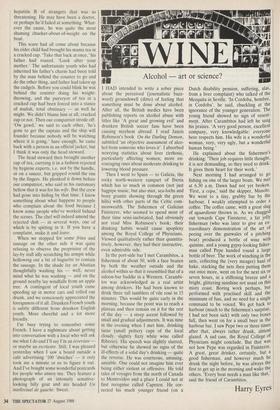Alcohol — art or science?
Then I went to Spain — to Galicia, the rocky north-western rampart of Iberia which has so much in common (not just bagpipe music, but also mist, sea-lochs and bony granite showing through the green hills) with other parts of the Celtic com- monwealth. The fishermen of Galician Finisterre, who seemed to spend most of their time semi-inebriated, had obviously not read Miss Robinson's book; their drinking habits would cause apoplexy among the Royal College of Physicians. Viewed qualitatively rather than quantita- tively, however, they had their instructive, even admirable side.
In the port-side bar I met Carambitos, a fisherman of about 50, with a face beaten by both the weather outside and the alcohol within so that it resembled that of a saloon-bar baddie in a Western. Carambi- tos was acknowledged as a real artist among drinkers. He had been known to drink three tall tumblers of vile rosé in 15 minutes. This would be quite early in the morning, because the point was to reach a plateau and then remain on it for the rest of the day — a steep ascent followed by small and gradual adjustments. It was nine in the evening when I met him, drinking tazas (small pottery cups of the local cloudy, slightly fizzy white wine called Riberio). His speech was slightly slurred, but otherwise he showed no signs of the ill-effects of a solid day's drinking — quite the reverse. He was courteous, amusing, amiable. One could not imagine him ever being either violent or offensive. He told tales of voyages from the north of Canada to Montevideo and a place I could not at first recognise called Capeton. He cor- rected his much younger friend (on a Dutch disability pension, suffering, alas, from a liver complaint) who talked of the Mezquita in Seville. 'In Cordoba, hombre, in Cordoba', he said, chuckling at the ignorance of the younger generation. The young friend showed no sign of resent- ment. After Carambitos had left he sang his praises. 'A very good person, excellent company, very knowledgable: everyone here respects him. His wife is a wonderful woman, very, very ugly, but a wonderful human being.' He explained about the fishermen's drinking: 'Their job requires little thought, it is not demanding, so they need to drink. It gives them heart for their work.' Next morning I had arranged to go fishing on one of the larger boats. We met at 6.30 a.m. Dawn had not yet broken. 'First, a copa,' said the skipper, Manolo. We went to a tiny, grubby bar by the harbour. I weakly attempted to order a coffee. The coffee came, with a great slug of aguardiente thrown in. As we chugged out towards Cape Finisterre, a fat jolly fisherman (who was later to give an ex- traordinary demonstration of the art of peeing over the gunwales of a pitching boat) produced a bottle of wine with quinine, and a young gypsy-looking fisher- man called Pepe handed round a large bottle of beer. The work of winching in the nets, collecting the (very meagre) haul of hake, stacking the nets then putting them out once more, went on for the next six or seven hours, in a stiffening breeze and .a bright, glittering sunshine not usual on this misty coast. Boring work perhaps, but performed with practised skill and the minimum of fuss, and no need for a single command to be voiced. We got back to harbour (much to the fishermen's surprise, I had not been sick) with only two boxes full, then went on for a small beer in the harbour bar. I saw Pepe two or three times after that, always rather drunk, almost glazed. A sad case, the Royal College of Physicians might conclude. But that was not how Pepe was regarded in Finisterre. A great, great drinker, certainly, but a good fisherman, and however much he drank the night before, he was always the first to get up in the morning and wake the others. 'Every boat needs a man like that, said the friend of Carambitos.
Harry Eyres














































 Previous page
Previous page